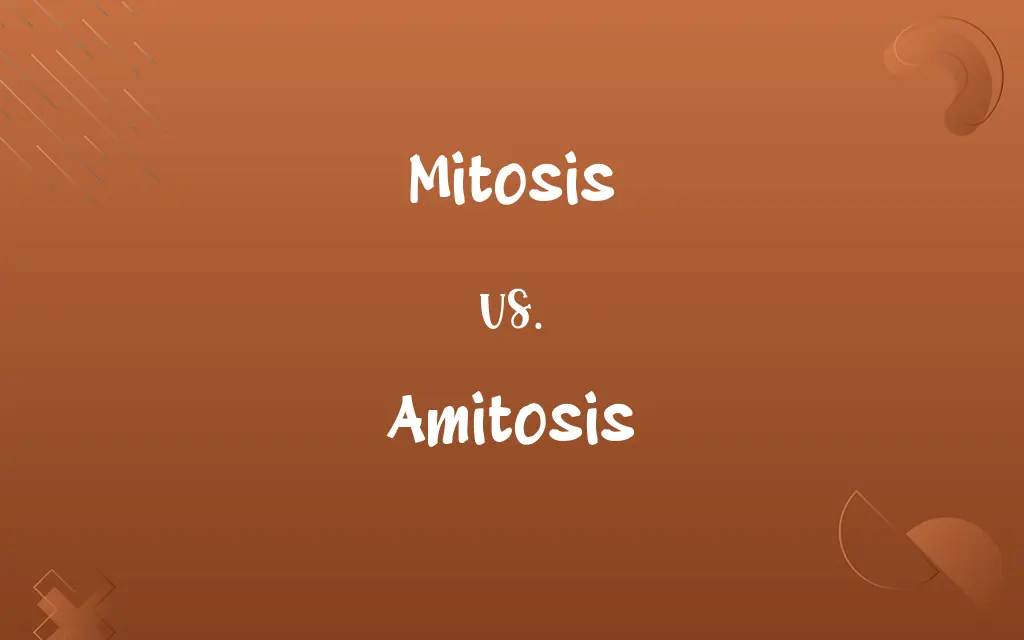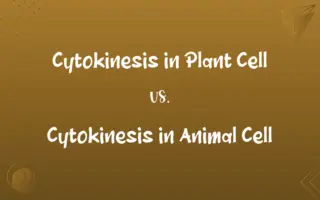Mitosis vs. Amitosis: Know the Difference

By Shumaila Saeed || Updated on December 25, 2023
Mitosis is a type of cell division where a cell divides into two identical daughter cells, whereas amitosis is a simpler form where the nucleus divides directly without forming chromosomes.

Key Differences
Mitosis is a complex process of cell division that results in two genetically identical daughter cells, involving the duplication and separation of chromosomes. Amitosis, on the other hand, is a less common and simpler process where the cell's nucleus divides directly without the formation of chromosomes, leading to daughter cells that may not be genetically identical.
Shumaila Saeed
Dec 07, 2023
In mitosis, the cell goes through distinct phases such as prophase, metaphase, anaphase, and telophase, ensuring accurate chromosome alignment and segregation. Amitosis lacks these organized stages and involves a direct splitting of the nucleus, which can result in uneven distribution of genetic material.
Shumaila Saeed
Dec 07, 2023
Mitosis is crucial for growth, development, and tissue repair in multicellular organisms, ensuring genetic consistency across cells. Amitosis, however, is observed in some unicellular organisms and certain specialized cells, playing a role in asexual reproduction or rapid cell division under specific conditions.
Shumaila Saeed
Dec 07, 2023
The regulation of mitosis is highly controlled and involves numerous checkpoints to prevent errors in chromosome separation, crucial for preventing genetic disorders. Amitosis lacks such intricate regulation, leading to a more random and less predictable division process.
Shumaila Saeed
Dec 07, 2023
Mitosis contributes to genetic stability by equally distributing replicated chromosomes, crucial for the proper functioning of complex organisms. In contrast, amitosis can lead to genetic variability, which might be beneficial in environments where adaptation is necessary, but can also result in genetic abnormalities.
Shumaila Saeed
Dec 07, 2023
ADVERTISEMENT
Comparison Chart
Division Process
Involves distinct phases (prophase, metaphase, anaphase, telophase)
Direct splitting of the nucleus without phases
Shumaila Saeed
Dec 07, 2023
Genetic Consistency
Produces genetically identical daughter cells
May result in daughter cells with variable genetic content
Shumaila Saeed
Dec 07, 2023
Occurrence
Common in multicellular organisms for growth and repair
Observed in some unicellular organisms and specialized cells
Shumaila Saeed
Dec 07, 2023
Regulation
Highly regulated with multiple checkpoints
Less regulated and more random
Shumaila Saeed
Dec 07, 2023
Role in Organisms
Essential for development, growth, and tissue repair
Involved in asexual reproduction or rapid division under specific conditions
Shumaila Saeed
Dec 07, 2023
ADVERTISEMENT
Mitosis and Amitosis Definitions
Mitosis
Mitosis is a fundamental process for growth, development, and repair in multicellular organisms.
During the healing of a wound, mitosis plays a critical role in regenerating tissue.
Shumaila Saeed
Nov 25, 2023
Amitosis
Amitosis is a simple form of cell division where the nucleus divides directly without forming chromosomes.
In some bacteria, cell division through amitosis allows for rapid reproduction under favorable conditions.
Shumaila Saeed
Nov 25, 2023
Mitosis
Mitosis consists of several phases including prophase, metaphase, anaphase, and telophase.
During metaphase of mitosis, chromosomes align at the cell's equator before being separated.
Shumaila Saeed
Nov 25, 2023
Amitosis
Amitosis is characterized by the direct splitting of the nucleus, often resulting in unequal distribution of genetic material.
Amitosis in certain protozoa results in two unequal daughter cells, each with a portion of the original nucleus.
Shumaila Saeed
Nov 25, 2023
Mitosis
Mitosis is a tightly regulated process ensuring genetic stability and preventing disorders.
Errors in mitosis can lead to chromosomal abnormalities, highlighting its importance in cell division.
Shumaila Saeed
Nov 25, 2023
ADVERTISEMENT
Amitosis
Amitosis can contribute to genetic variability, advantageous in certain ecological niches.
The variability resulting from amitosis provides some microorganisms with adaptive advantages in fluctuating conditions.
Shumaila Saeed
Nov 25, 2023
Mitosis
Mitosis is the process of cell division in eukaryotic cells that results in two genetically identical daughter cells.
In human skin cells, mitosis constantly occurs to replace dead or damaged cells.
Shumaila Saeed
Nov 25, 2023
Amitosis
Amitosis occurs in certain unicellular organisms and specialized cells, facilitating asexual reproduction or rapid cell division.
The amitotic division in some algae species enables them to quickly adapt to changing environments.
Shumaila Saeed
Nov 25, 2023
Mitosis
Mitosis involves the duplication and equal distribution of a cell's chromosomes.
The precision of mitosis ensures that each daughter cell receives an exact copy of genetic material.
Shumaila Saeed
Nov 25, 2023
Amitosis
Amitosis is less common and less regulated than mitosis, lacking distinct division phases.
Due to its simplicity, amitosis is not suitable for the complex cell division required in multicellular organisms.
Shumaila Saeed
Nov 25, 2023
Mitosis
The process in cell division by which the nucleus divides, typically consisting of four stages, prophase, metaphase, anaphase, and telophase, and normally resulting in two new nuclei, each of which contains a complete copy of the parental chromosomes.Also called karyokinesis.
Shumaila Saeed
Oct 19, 2023
Amitosis
Direct cell division by simple cleavage of the nucleus, without spindle formation or the appearance of chromosomes.
Shumaila Saeed
Oct 19, 2023
Mitosis
The entire process of cell division including division of the nucleus and the cytoplasm.
Shumaila Saeed
Oct 19, 2023
Amitosis
Cell division by cleavage of the nucleus without the formation of condensed chromosomes
Shumaila Saeed
Oct 19, 2023
Mitosis
(cytology) The division of a cell nucleus in which the genome is copied and separated into two identical halves. It is normally followed by cell division.
Shumaila Saeed
Oct 19, 2023
Amitosis
Cell division in which there is first a simple cleavage of the nucleus without change in its structure (such as the formation of chromosomes), followed by the division of the cytoplasm; direct cell division; - opposed to mitosis. It is not the usual mode of division, and is believed by many to occur chiefly in highly specialized cells which are incapable of long-continued multiplication, in transitory structures, and in those in early stages of degeneration.
Shumaila Saeed
Oct 19, 2023
Amitosis
The direct method of cell division characterized by simple division of the nucleus without formation of chromosomes
Shumaila Saeed
Oct 19, 2023
Mitosis
Cell division in which the nucleus divides into nuclei containing the same number of chromosomes
Shumaila Saeed
Oct 19, 2023
Repeatedly Asked Queries
In which organisms is amitosis typically found?
Mostly in some unicellular organisms and certain specialized cells.
Shumaila Saeed
Dec 07, 2023
What is mitosis?
A type of cell division in eukaryotes resulting in two identical daughter cells.
Shumaila Saeed
Dec 07, 2023
What is amitosis?
A simple cell division where the nucleus splits directly, often found in unicellular organisms.
Shumaila Saeed
Dec 07, 2023
Does amitosis involve similar phases to mitosis?
No, amitosis lacks the distinct phases seen in mitosis.
Shumaila Saeed
Dec 07, 2023
How does mitosis differ from amitosis in terms of genetic consistency?
Mitosis ensures genetic consistency, while amitosis can lead to variable genetic content in daughter cells.
Shumaila Saeed
Dec 07, 2023
Where is mitosis commonly observed?
In multicellular organisms for growth, development, and tissue repair.
Shumaila Saeed
Dec 07, 2023
How many phases does mitosis have?
prophase, metaphase, anaphase, and telophase.
Shumaila Saeed
Dec 07, 2023
Is mitosis a regulated process?
Yes, it's highly regulated with multiple checkpoints.
Shumaila Saeed
Dec 07, 2023
Can amitosis lead to genetic abnormalities?
Yes, due to the uneven distribution of genetic material.
Shumaila Saeed
Dec 07, 2023
Can mitosis lead to genetic variation?
Typically, no, as it produces genetically identical cells.
Shumaila Saeed
Dec 07, 2023
What role does mitosis play in multicellular organisms?
It is crucial for growth, development, and tissue repair.
Shumaila Saeed
Dec 07, 2023
Is amitosis a common form of cell division?
It's less common compared to mitosis.
Shumaila Saeed
Dec 07, 2023
What happens during metaphase in mitosis?
Chromosomes align at the cell equator before being separated.
Shumaila Saeed
Dec 07, 2023
What advantages does amitosis offer?
It allows for rapid division and adaptation in certain unicellular organisms.
Shumaila Saeed
Dec 07, 2023
What are the risks associated with errors in mitosis?
Errors can lead to chromosomal abnormalities and genetic disorders.
Shumaila Saeed
Dec 07, 2023
Can amitosis result in unequal cell sizes?
Yes, due to the direct and unequal division of the nucleus.
Shumaila Saeed
Dec 07, 2023
Can amitosis occur in multicellular organisms?
Rarely, it's mostly confined to unicellular organisms and specific cell types.
Shumaila Saeed
Dec 07, 2023
What is the significance of mitosis in human health?
It's vital for normal growth, healing, and maintaining cellular health.
Shumaila Saeed
Dec 07, 2023
Is amitosis beneficial for rapid environmental adaptation?
Yes, in certain organisms, it facilitates quick adaptation.
Shumaila Saeed
Dec 07, 2023
How does mitosis contribute to an organism's health?
By replacing dead or damaged cells and maintaining tissue health.
Shumaila Saeed
Dec 07, 2023
Share this page
Link for your blog / website
HTML
Link to share via messenger
About Author
Written by
Shumaila SaeedShumaila Saeed, an expert content creator with 6 years of experience, specializes in distilling complex topics into easily digestible comparisons, shining a light on the nuances that both inform and educate readers with clarity and accuracy.































































